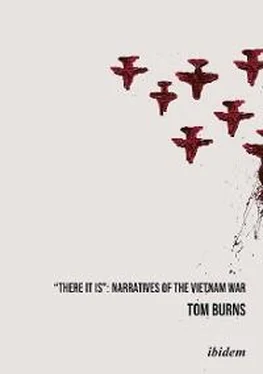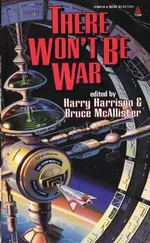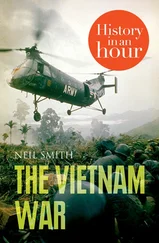1 ...7 8 9 11 12 13 ...40 Remembering also remains an important experience for the culture as a whole, especially American culture, which tends, like other cultures, to mythologize its past. Ringnalda, for example, complains that
much of America’s memory of Vietnam is on the [ Catch-22 ’s Snowden’s] hip wound inflicted on the proud myths of the City on a Hill. And sad to say, much of its energy is focused on restoring those myths. Too often the radical wound goes unattended, perhaps out of collective and in individual fear that it’s beyond treatment. 88
Ringnalda cites novelist Tim O’Brien, who told a group of students that the First Gulf War, so soon after Vietnam, proved that the latter war never happened: “History and memory had been air-brushed out of existence.” 89The misinterpretation of history can be a way of reinterpreting reality, and it has not been confined to the war in Vietnam. World War II was a horrific historical event that has been relentlessly mythologized as the “Good War” ever since its close in 1945. As Fussell, a student of the culture of the two world wars, has written, “America has not yet understood what the Second World War was like and thus been able to use such understanding to re-interpret and redefine the national reality.” 90Although some commentators have drawn connections between American myths and attempts to explain—or explain away—the war, Marilyn B. Young argues that the war is too large an event in our consciousness to be able to will it to disappear:
What militarists deplore as the Vietnam syndrome can better be understood as a relatively unique event in American history: an inability to forget, a resistance to the everyday workings of historical amnesia, despite the serious and coordinated efforts of the government and much of the press to “heal the wounds” of the war by encouraging such forgetting. 91
One motive for this will to forgetfulness is that until Vietnam, defeat in war, with the exception of the American South, had not been a part of American historical experience. Indeed, the collective trauma of defeat seemed to be so strong that the Vietnam War was forgotten—repressed—for a decade. But it refused to go away, insisting on being recovered because of the traumatic collective consciousness of national defeat.
In the meantime, historians, social scientists, literary critics, and other scholars have attempted to explain the war for their own purposes. Here, as always in American history, American literature has played an essential critical role in interpreting the collective past. In Philip K. Jason’s view, “the imaginative literature of the Vietnam War, broadly defined, participates—whether overtly or covertly, consciously or unconsciously—in a struggle for the national memory.” 92Another important critic, Milton J. Bates, also reminds us how literature may play different interpretive roles: “the war story, like war itself, is politics by other means.” 93Bates argues that other critics who have written lucidly about the literature of the war (e.g. Myers, Melling, Capps, Martin), have shown how popular culture, especially film, “endorsed President Reagan’s attempt to make Vietnam a ‘noble cause’,” while the more serious literature has “resisted the conservative drift of popular myths.” 94In this study of the Vietnam War literature, I shall pay more attention to the serious literature of the war but also discuss a few popular works that mythologize the war and its American participants.
The memory inscribed in the fiction and memoirs of the war is a necessary and important part of this work of historical recovery. The culture of the past, as Northrop Frye once said, is not only the memory of mankind but also of our own buried life. Politicians like Ronald Reagan, Gerald Ford, and George Bush, as well as their conservative epigones, have done their best to bury Vietnam, with its lingering smell of defeat—defeat being perceived as somehow un-American. As one of the soldier-writers, Philip Caputo, has written: “Our self-image as a progressive, virtuous, and triumphant people exempt from the burdens and tragedies of history came apart in Vietnam, and we had no way to integrate the war or its consequences into our collective and individual consciousness.” 95The attempted conservative transformation of the historical experience of the war into myth has already taken place in popular fiction and film, in which patriotic distortions serve to mythologize the war’s sad realities. 96
It is my contention in this book that the serious literature of the war has refused that time-honored cultural move. As Hynes has written, the Vietnam War
lingers in American minds like the memory of an illness, a kind of fever that weakened the country until its people were divided and its cause was lost. That fever is in the narratives Americans have written about the war, and it makes their soldiers’ tales different from the tales of other modern wars—not simply because the United States lost, though that had not happened before, but because in the loss there was humiliation and bitterness and the burden of complicity in a nation’s moral failure. 97
The American literature of the Vietnam War is dominated by narratives, fictional and non-fictional, 98although the distinction between fictional and non-fictional has often been called into question in those very narratives, as will be seen in Chapter Six on war memoirs and some of the later chapters. The more conventional combat narratives, like those of the two world wars, recall and recreate characters from the military rank-and-file, the soldiers who actually fought, forming therefore a literature of experience that maintains thematic continuity with the narratives of previous wars, a theme developed in Chapter Eight on combat realism. A character from a fictional work by Tim O’Brien, one of the most important novelists of the war, recognizes this connection in his novel Going After Cacciatto (1978), when the narrator refuses to concede that the elemental experience of the men in Vietnam was distinct from that of previous wars:
War kills and maims and rips up the land and makes orphans and widows. These are the things of war. Any war. So when I say there is nothing new to tell about Nam, I’m saying it was just a war like every war. Politics be damned. Sociology be damned…I’m saying that the feel of war is the same in Nam or Okinawa—the emotions are the same, the same fundamental stuff is seen and remembered. 99
The insistence on the experience of war as universal, a claim made by so many previous war novels, holds true with respect to the individual soldier under the stress of combat, the focus of many of these works, including those examined here. When a man is under fire, it hardly matters to him who is doing the firing or the shelling, or why it is taking place, but it is also true that wars qua historical events are significantly different and are experienced in different ways. The motivations and concerns of the combat infantryman in any war are rarely a question of global politics, but the men who fought in World War II knew, even when they did not want to be there, that they had to win the war before they could go home. The cynicism of the men who fought in Vietnam, on the other hand, is closer to that of the combatants of World War I, who also experienced individual and collective disillusionment from their participation in a kind of war for which they had not been prepared. The soldiers in Vietnam often suspected that their war would never be won and that their sacrifices were therefore in vain. The point is succinctly made by O’Brien in the very same novel cited above, in speaking of the soldiers in Vietnam (“They”), with allusions to those of World War II as a meaningful contrast:
They did not know even the simple things: a sense of victory of satisfaction, or necessary sacrifice. They did not know the feeling of taking a place and keeping it, securing a village and then raising the flag and calling it a victory. No sense of order or momentum. No front, no rear, no trenches laid out in neat parallels. No Patton rushing for the Rhine, no beachheads to storm and win and hold for the duration. They did not have targets. They did not have a cause. 100
Читать дальше












